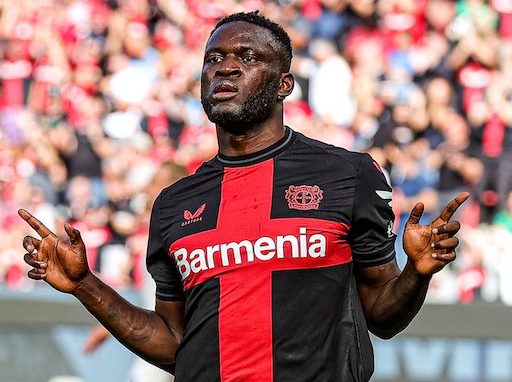The Collapse of Victor Boniface’s Transfer to AC Milan: A Deep Dive into Medical Concerns and Contractual Complications
The football world was abuzz with the news of Victor Boniface’s impending move to AC Milan, a transfer that promised to bolster the Italian giants’ attacking prowess. The Nigerian striker, known for his speed, strength, and clinical finishing, appeared poised to embark on a new chapter in his career, leaving Bayer Leverkusen for the allure of Serie A. However, the anticipated transfer saga took an unexpected turn as AC Milan abruptly called off the deal, citing concerns over Boniface’s medical examination results. This sudden reversal has cast a shadow over the player’s future and raised questions about the due diligence processes involved in high-stakes football transfers.
The agreement between AC Milan and Bayer Leverkusen seemed all but finalized, with a structured deal involving a €5 million loan fee and a €24 million buy option. Boniface had even traveled to Milan, fueling speculation that the transfer was imminent. Renowned transfer expert Fabrizio Romano confirmed the verbal agreement and Boniface’s presence in Milan, only to later announce the deal’s collapse due to the failed medical. This news sent shockwaves through the footballing community, leaving fans and pundits alike wondering about the nature of the medical issues that derailed the transfer.
Reports emerged suggesting that Boniface’s medical history, which included two anterior cruciate ligament (ACL) surgeries and recurring groin problems, played a significant role in AC Milan’s decision. ACL injuries are notoriously difficult to recover from, often requiring extensive rehabilitation and posing a long-term risk of re-injury. Groin issues, while less severe, can also be persistent and debilitating for athletes, particularly those involved in high-intensity sports like football. These pre-existing conditions raised red flags for AC Milan’s medical team, prompting them to exercise caution and ultimately terminate the transfer proceedings.
This was not the first instance where Boniface’s medical record had caused concern amongst potential suitors. AS Roma, another prominent Serie A club, had reportedly explored the possibility of acquiring Boniface in a swap deal involving Ukrainian forward Artem Dovbyk. However, similar concerns over Boniface’s fitness led Roma to reject the proposal. This prior instance underscores the seriousness of the medical issues and highlights the thoroughness with which clubs evaluate player fitness before committing to substantial financial investments.
The collapse of the transfer has significant implications for both Boniface and AC Milan. For Boniface, the failed medical raises questions about his long-term prospects and the potential impact on his career trajectory. While his talent remains undeniable, the recurring injuries pose a challenge to his ability to maintain peak performance and contribute consistently at the highest level. He now faces the prospect of returning to Bayer Leverkusen, where his future remains uncertain.
For AC Milan, the failed transfer represents a setback in their efforts to strengthen their squad. The club had identified Boniface as a key target to bolster their attacking options, and his absence leaves a void in their plans. They will now have to explore alternative options in the transfer market, potentially at a higher cost and with less certainty of securing a player of Boniface’s caliber.
The Boniface transfer saga serves as a stark reminder of the crucial role that medical examinations play in the complex world of football transfers. While clubs often focus on a player’s on-field abilities and potential, the medical assessment is an equally important aspect of the due diligence process. A thorough medical evaluation can reveal underlying issues that may impact a player’s long-term health and performance, potentially saving clubs from costly mistakes and protecting players from further injury. In this instance, AC Milan’s medical team performed their due diligence, ensuring the club made an informed decision, even if it meant losing out on a potential star player.


